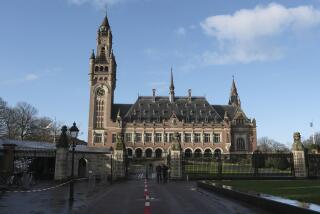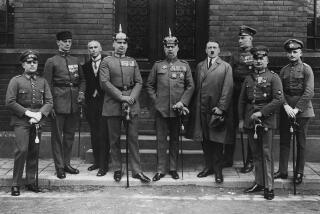Pinochet Case Shrinks Globe for Ex-Tyrants
LONDON — To be sure, former Chilean dictator Augusto Pinochet wishes he had never decided to vacation in London this year, and other former despots are seeking warmer climes after a verdict by Britain’s highest court that heads of state may be tried for crimes such as torture and genocide.
However, legal experts say the impact of last week’s ruling by a House of Lords tribunal reaches far beyond Pinochet and Britain’s borders.
“The effect legally is to open up courts around the world for these cases,” said Michael Posner, executive director of the New York-based Lawyers Committee for Human Rights. “The effect psychologically is to remind people that justice has to be done in the most egregious cases.”
Although no one expects a sudden rush of prosecutions of former heads of state, the ruling signals that despots no longer can commit crimes against humanity and then expect to travel the globe freely--at least not after they retire from office.
They may claim immunity and craft amnesty deals at home, but once they venture beyond their own borders, former heads of state can be held accountable by foreign courts for human rights abuses, be they against their own citizens or foreigners.
That may be good news for those who would seek to prosecute the likes of Uganda’s Idi Amin--under whose 1971-79 rule hundreds of thousands of people were tortured or killed--should he leave his haven in Saudi Arabia.
There is concern among some legal experts, however, that such a broad judgment eventually could be used to press politically motivated cases against world leaders such as former British Prime Minister Margaret Thatcher or even, one day, President Clinton.
An Argentine court could seek to prosecute Thatcher over the sinking of the General Belgrano, on which more than 300 Argentine sailors died during the 1982 Falklands War, while Sudan could wait until Clinton leaves office and seek his extradition for the bombing of a Sudanese chemical factory in August.
For similar reasons, Cuban President Fidel Castro has expressed opposition to the arrest of Pinochet, his ideological enemy, and to the Chilean’s possible extradition to Spain for trial.
He apparently fears that the case sets a precedent that the United States could someday try to use against him.
“This is going to open the door to efforts by all kinds of groups and governments to go after their enemies,” conceded Posner of the Lawyers Committee. “It will be used, and people will try to misuse it. But that isn’t a reason to avoid the principle that the worst behavior deserves criminal sanctions. We will have to figure out the rules of the road as we go along.”
In the 3-2 vote last week, the panel of Law Lords held that crimes such as torture, hostage-taking and genocide are not official functions of a head of state and, therefore, the leaders do not enjoy immunity from prosecution.
Pinochet, a former head of state, could be tried like anybody else for such crimes, they said.
Human rights lawyers see the decision as the coming of age of international law 50 years after the United Nations adopted the Universal Declaration of Human Rights.
While it applies only to Britain, they believe that the ruling by judges in the conservative House of Lords will encourage similar moves in other countries.
“If these people think the law has changed, then it has,” said Michael Byers, who teaches international law at Oxford University.
The ruling builds on a body of international law, beginning with the Nuremberg tribunal in 1945, that says there can be no immunity for the most heinous crimes against humanity.
In 1988, Britain adopted legislation that allows those who commit torture abroad to be prosecuted in this country or elsewhere.
Britain also was one of 120 countries that voted in July to create an international criminal court with jurisdiction over war crimes and crimes against humanity. The court, which must be ratified by 61 nations, would be in The Hague.
“The Law Lords effectively said that when you are dealing with crimes like torture under international law, traditional concepts such as sovereignty and state immunity are trumped by the most fundamental value of human rights,” Byers said.
“One consequence of this may be that some people may have to travel less, but it is a small price to pay if the end result is that hundreds of lives are saved by a deterrent factor,” Byers said.
Not everyone sees the move toward the jurisdiction of international courts as positive. The United States voted against the creation of the international criminal court this summer out of concern that it eventually could be used to press politically motivated cases against U.S. soldiers and officials abroad.
Some legal observers are equally skeptical.
“The question arises . . . whether universal standards enforced by ambitious courts and bureaucracies are the best way to ensure that fundamental decencies of behavior within and between states are observed,” commentator Robin Harris wrote in London’s Daily Telegraph newspaper. “Experience suggests otherwise.”
International judicial power, he added, “is not subject to proper democratic scrutiny. There has been remarkably little pretense of impartiality in recent human rights causes celebres.”
Some diplomats and legal experts worry that renegade judges and court cases around the world could muck up the peace process in Northern Ireland or destabilize the political situation in South Africa as well as Chile. They fear that if Pinochet is extradited to Spain and put on trial as a result of the Law Lords’ ruling, it will be harder to persuade dictators to step down in the future.
Elliott Abrams, the former assistant secretary of State who helped negotiate the departure of Jean-Claude “Baby Doc” Duvalier from Haiti under the Bush administration, told the Daily Telegraph: “You can’t say, ‘You will be hunted to death, you fiend.’ This makes future negotiations more difficult.”
The United States has said that other countries should respect the Chilean government’s request that Britain not extradite the 83-year-old Pinochet to Spain. The Santiago regime wants him sent back to Chile instead.
But one U.S. ally, Turkey, is hoping that the court verdict will serve as a precedent in its battle for the extradition of Kurdish rebel leader Abdullah Ocalan from Italy. The Turkish government charges that Ocalan, as the leader of the Kurdistan Workers Party, is responsible for the deaths of 30,000 people in a separatist campaign.
“The Pinochet verdict counts as good news for Turkey in its efforts to ensure the extradition and trial of [Ocalan],” said Turkey’s major daily newspaper, Milliyet.
Already, prosecutions by European courts of atrocities in Latin America have made the suspects virtual prisoners in their own countries. More than 150 military men in Argentina and Chile are afraid to travel abroad because they are under investigation or, in a few cases, have been convicted by courts in Spain, France and other countries.
But human rights workers in El Salvador feel buoyed by the Law Lords’ decision, saying it might one day help them get those ultimately responsible for some of the country’s most notorious human rights cases--the 1980 killings of four American religious women and the 1989 assassinations of six Jesuit priests, their cook and her daughter. Five of the priests were Spanish citizens.
Times staff writers Juanita Darling in San Salvador and Sebastian Rotella in Buenos Aires contributed to this report.
More to Read
Sign up for Essential California
The most important California stories and recommendations in your inbox every morning.
You may occasionally receive promotional content from the Los Angeles Times.










